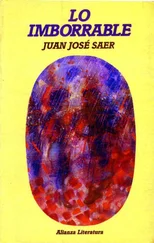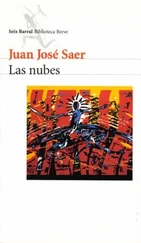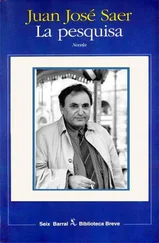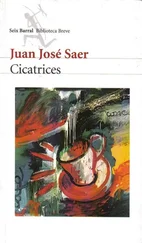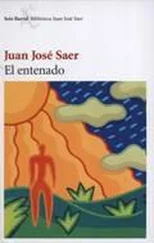Hooded by sacks and suffocating, arms bound to our chests by ropes, we were placed on a vessel; the regular sound of its oars accompanied us for some twenty minutes, and then we were hoisted like bundles onto a ship’s deck; finally, they removed the sacks, but returned to bind us at the wrists and ankles with our arms behind us — a humiliating treatment that, I recognize, was effected firmly but not roughly — and left us alone in a silent cabin enveloped in the deepest darkness. Distant voices and sounds reached us, and at last we realized that the ship where we lay sequestered had weighed anchor and was sailing at a steady clip to destinations unknown. In the hours of our imprisonment, the doctor, who had not lost the habit or capacity of reasoning with methodical patience, elaborated a series of hypotheses about the remarkable events that had transpired, and when we heard the door open and a man’s calm, educated voice began to apologize in English for how they had been obliged to treat us, the doctor (a revealing detail if one takes into account that he had been tied hand and foot and hurled into darkness) responded with perfect tranquility in perfect English that we understood (also perfectly) what had happened, and that we were grateful how quickly the English government had acted to save our lives. When the lights came on we realized we were in the elegant guest cabin of an English frigate, whose captain, a tanned and affable Scotsman, was waiting for the two sailors who accompanied him to untie our bonds and help us to our feet before giving us a jovial welcome. A month later, penniless and still a little shaken, more by recent events than by the volatility of the rough, gray ocean, and the captain having conceded to Dr. Weiss every game of chess they played during the voyage, we disembarked one sad and rainy morning in Liverpool.
I have dwelt on the establishment of Casa de Salud and, in brief, I have noted the treatment methods of Dr. Weiss, his character and philosophy, as well as the ravages of the barbarity that in a few hours left the work not even of years, but of my teacher’s entire life, in ruins. It was a calling to build that institution from nothing, especially in a time of unrest, and my sole, original contribution to it was that month-long trip through the plains, in such demanding conditions, which constitutes the principal theme of this memoir. (In any case, that trip was a unique experience for me, for which, as will be addressed later on, I am also in debt to Dr. Weiss, and I hope that my instructor, forgiving the egoism in supposing to present myself as the protagonist of my tale, will be good enough to consider that I relate what was for me the most singular adventure of my life.)
The patients we had to transfer from the city of Santa Fé, located on the banks of the great river across from my birthplace and some hundred leagues north of Las Tres Acacias, were people disturbed in their innermost selves by the ravages of insanity and required special care; the voyage across the desert plain was an aggravation to their conditions, but their derangement was at the same time itself disruptive, and, by its singular presence, helped break the balance of the old, unwritten laws of the desert. Patients, Indians, women of ill repute, gauchos, soldiers, and even animals, domestic and otherwise — we had to live together for many days in the desert which, though already hostile by definition, saw its hostility increase as unforeseen calamities amassed.
But it is better to start from the beginning. For the most part in the time of the Viceroyalty, when a family wished to place one of its members in Casa de Salud, the transfer of the patient took place independently, and the necessary agreements were carried out by messenger: Over a couple of months, all the details were arranged, and the patient was delivered to us, so to speak, at the door of our establishment, which, once crossed, left him in our hands and as our full responsibility. Such was the unbending rule that governed their hospitalization. Early in 1804, however, four simultaneous requests for admission came to us from different regions, and after laborious negotiations, less of a financial than a practical nature, we consented to gather the patients in the city where I, as Dr. Weiss had decided, would go to fetch them, as said city lay approximately halfway between the places those patients came from and Las Tres Acacias. No expense was too great and no effort was spared when one sought to rid oneself of a madman, as it is difficult to find anything in the world that can be more of a bother, and so with the combined forces of the four families, one of which was in fact a religious community, it was possible to organize a mobile hospital of which I would be a sort of director for the duration of the trip through the desert. (A relative “desert,” moreover, for a series of outposts was placed every ten to fifteen leagues or so, and though miserable at best, they alleviated the distance somewhat. Unfortunately, circumstances would deprive us of them.)
That curious convoy we formed and the episodes that arose along our route, in my opinion, deserve a detailed retelling, and if I refrain from publishing it for now, this memoir will provide for some future reader, I hope, not only a picturesque charm, but also genuine scientific interest. Indeed, it is this scientific aspect that prevents the immediate publication of these pages, as my scrupulous preoccupation with accuracy has resulted in notes on the behavior of the deranged and of the other members of the caravan, alongside the transcription of their language, free of empty rhetoric, which might shock certain sensitive souls — but the scientific spirit will not be shocked, for it understands the reality of insanity and the true motivations of both man and beast, and how false by comparison are those notions that pass for rational and prevail in worldly assemblies. Those faithful descriptions, whose absence in a scientific tract would be reproached, might seem offensive in a memoir where personal experiences appear as well, but in this fidelity to truth, indifferent to prejudice and the disapproval of the majority, I do no more than follow the example of Dr. Weiss, who made that fidelity at all times a principle of science, and of life.
So we left at daybreak one morning in June: our guide Osuna, two escort soldiers, and I — still entangled in an anxious night’s sleep, teeth chattering with cold as in certain mornings of my childhood — I, who could not manage to hold my horse at a steady gallop to keep pace with my traveling companions. Always riding slightly ahead of us, swathed in his red-and-green-striped poncho, rode Osuna, rigid in his saddle, maintaining his horse’s regular stride without any visible motion to denote his mastery over the animal. Of the many hardships that made up our voyage, that image, though of no particular moment, neutral, as it were, is the one that visits me most frequently thirty years later, sharp and vivid: Osuna galloping parallel to the rising sun as it rose from the riverbank, the rider’s right side haloed in red while the horse’s left profile remained ever blotted with shadow. That image is both more and less than a memory now that, without my willing, returns with its original clarity in the most unexpected moments and situations of the day, and, on certain nights, when I lie in darkness with my head resting on the pillow before sleep’s black curtain closes completely, it is the last thing I see; certain mornings, after having deserted me for so long that I have all but forgotten, it is the first thing that appears with such renewed force — I might say it draws all the universe along behind it, making it dance about day-long in the waking theater. (The persistence of this primordial image, the first thing I saw in the light of day to begin my voyage, is explained by the state of elation I found myself in, from Dr. Weiss’s trust in me, placing the patients’ fates in my hands. Later, I would learn that the doctor had done so knowingly, deliberately. The ordeals of the trip failed to diminish the elation of the departure, whereas caution frequently tempered my enthusiasm at many points during our return.)
Читать дальше



